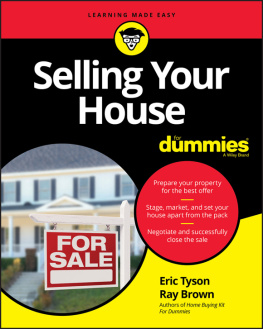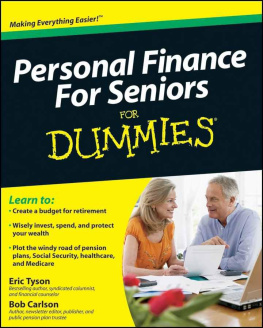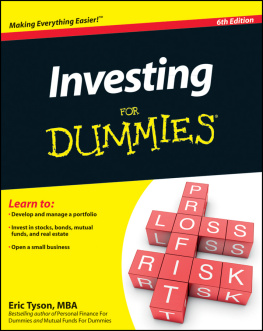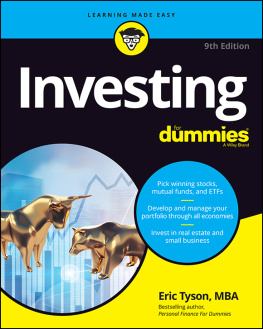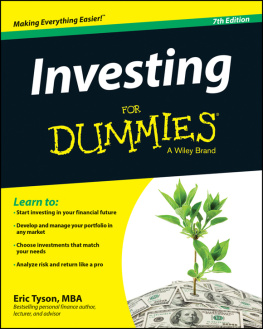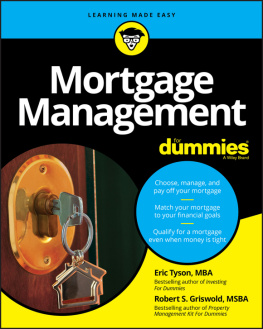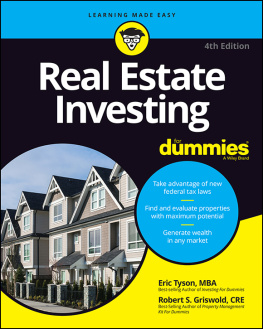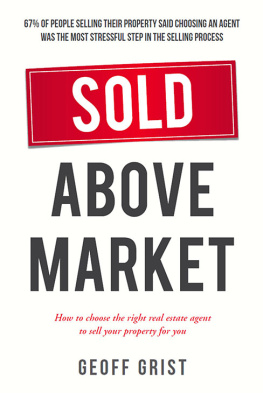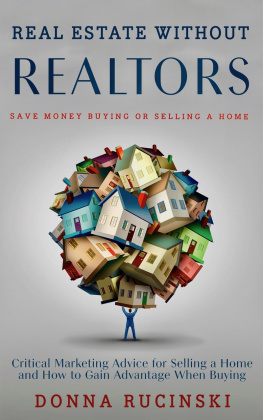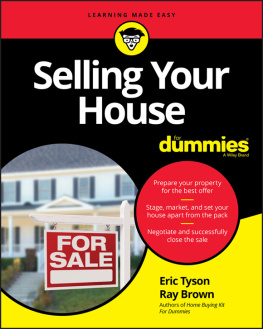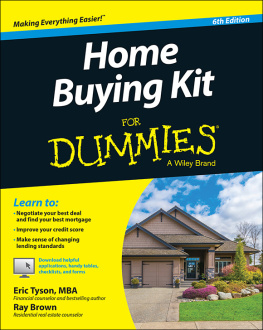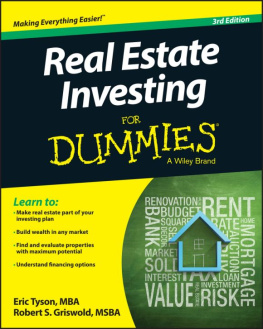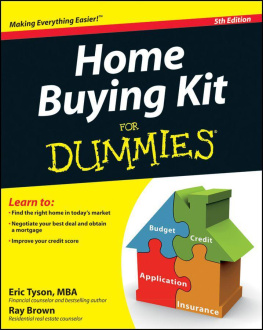

Selling Your House For Dummies
Published by:
John Wiley & Sons, Inc.
111 River Street
Hoboken, NJ 07030-5774
www.wiley.com
Copyright 2018 by Eric Tyson, Ray Brown, and John Wiley & Sons, Inc.
Published simultaneously in Canada
No part of this publication may be reproduced, stored in a retrieval system or transmitted in any form or by any means, electronic, mechanical, photocopying, recording, scanning or otherwise, except as permitted under Sections 107 or 108 of the 1976 United States Copyright Act, without the prior written permission of the Publisher. Requests to the Publisher for permission should be addressed to the Permissions Department, John Wiley & Sons, Inc., 111 River Street, Hoboken, NJ 07030, (201) 748-6011, fax (201) 748-6008, or online at http://www.wiley.com/go/permissions .
Trademarks: Wiley, For Dummies, the Dummies Man logo, Dummies.com, Making Everything Easier, and related trade dress are trademarks or registered trademarks of John Wiley & Sons, Inc., and may not be used without written permission. All other trademarks are the property of their respective owners. John Wiley & Sons, Inc., is not associated with any product or vendor mentioned in this book.
LIMIT OF LIABILITY/DISCLAIMER OF WARRANTY: WHILE THE PUBLISHER AND AUTHOR HAVE USED THEIR BEST EFFORTS IN PREPARING THIS BOOK, THEY MAKE NO REPRESENTATIONS OR WARRANTIES WITH RESPECT TO THE ACCURACY OR COMPLETENESS OF THE CONTENTS OF THIS BOOK AND SPECIFICALLY DISCLAIM ANY IMPLIED WARRANTIES OF MERCHANTABILITY OR FITNESS FOR A PARTICULAR PURPOSE. NO WARRANTY MAY BE CREATED OR EXTENDED BY SALES REPRESENTATIVES OR WRITTEN SALES MATERIALS. THE ADVICE AND STRATEGIES CONTAINED HEREIN MAY NOT BE SUITABLE FOR YOUR SITUATION. YOU SHOULD CONSULT WITH A PROFESSIONAL WHERE APPROPRIATE. NEITHER THE PUBLISHER NOR THE AUTHOR SHALL BE LIABLE FOR DAMAGES ARISING HEREFROM.
For general information on our other products and services, please contact our Customer Care Department within the U.S. at 877-762-2974, outside the U.S. at 317-572-3993, or fax 317-572-4002. For technical support, please visit https://hub.wiley.com/community/support/dummies .
Wiley publishes in a variety of print and electronic formats and by print-on-demand. Some material included with standard print versions of this book may not be included in e-books or in print-on-demand. If this book refers to media such as a CD or DVD that is not included in the version you purchased, you may download this material at http://booksupport.wiley.com . For more information about Wiley products, visit www.wiley.com .
Library of Congress Control Number: 2018931259
ISBN 978-1-119-43423-8 (pbk); ISBN 978-1-119-43431-3 (ebk); ISBN 978-1-119-43424-5 (ebk)
Top 20 Tips for House Sellers
- Determine whether you want to sell. Your most important house-selling decision is whether to sell. Take the time to research your options and the personal financial ramifications of each option before you sell. (See .)
- Consider the expenses and transaction costs. The expenses of selling your current house and buying another gobble a large chunk of your houses equity (that is, the market value of your property less the outstanding mortgage balance). Before you sell your house, weigh the expected benefits of buying a new home against these transaction costs. Be sure to estimate your proceeds of sale and relocation costs before selling. (See .)
- Review your mortgage options. Before you commit to selling your house, assess the mortgage options for your next purchase, especially if youre trading up to a more costly property. Remember, mortgage lenders and real estate agents cant tell you how much you can afford to borrow; they can only tell you the maximum amount that youre eligible to borrow. To determine the price you can afford to pay for your next home, you must also consider your financial goals and objectives. (See .)
- Do your homework if you consider providing financing to the buyer of your property. Do what a good mortgage lender does conduct a rigorous background investigation to determine the creditworthiness of the buyer. (See .)
- Time the marketing of your house to coincide with a strong selling season in your area. Timing is critically important. Try to time the sale of your house so it closes simultaneously with the purchase of your next home. Unless youre wealthy enough to afford the luxury of owning two properties at the same time, dont close on the purchase of your next home before your current one sells. (See .)
- Weigh the pros and cons of selling your house yourself. Be realistic about the amount of money you can actually save by selling without an agent and the amount of additional time and effort that you must invest. If you want to sell without a real estate agent, be sure to hire a good real estate lawyer and read this entire book so you do the best that you can. (See .)
- Field a great team. Selling your house usually requires that you hire and work with various real estate professionals (such as real estate agents, property inspectors, escrow officers, and, possibly, tax, legal, or financial advisors). If you put the right players on your team, you maximize your chances of a successful sale. To increase your chances of an efficient, top-dollar sale, obtain a good house inspection to discover problems before they become deal killers. (See .)
- Spend the time to find the best real estate agent. If youre going to have a real estate agent list your house for sale, invest the time to find the best possible agent. An agent who doesnt know property values in your area or doesnt understand the best way to market your house can be a liability. A knowledgeable, market-savvy agent can help you obtain a higher sale price and quicker sale. (See .)
- Thoroughly review and negotiate the real estate brokers listing contract. For most sellers, a 90-day listing that puts your house in the local multiple listing service is best. Remember that commissions and other terms of the listing agreement are negotiable. If you have any doubts as to whether to disclose a defect or problem with your house, err on the side of disclosure. Otherwise, you greatly increase your (and your real estate brokers) chances of being sued by disgruntled buyers. (See .)
- Do the right corrective and cosmetic work before putting your property on the market. Preparing your house for sale involves much more than just sticking a For Sale sign in your front yard. Avoid wasting money on major improvements that dont give you a good return on your investment. (See .)
- Check out other houses in your area. Whats it worth? is the most critical question youll ask when selling your house. To get the answer, examine sales of houses comparable to yours in size, age, condition, and location (a good agent can assist you). Price your house right, and it will sell because informed buyers recognize the value after seeing other houses with unrealistically high asking prices. (See .)
- Dont ignore generations of conditioning when pricing your property. In addition to smart pricing, use buyer incentives to help you sell faster and get a higher sale price. But be careful; dont use gimmicks that waste valuable time and money and end up stigmatizing your property. (See .)
- Get the word out. To create the most interest in and competition for your house, you must develop a comprehensive, well-coordinated marketing and advertising campaign plan. (See .)
Next page
